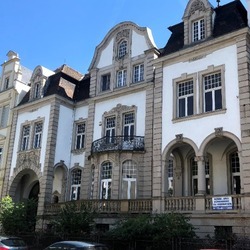Tourexpi
As global tourism continues to grow, some European
cities are exploring innovative ways to manage the influx of visitors.
Europe's most visited destinations have started
taking measures to tackle overtourism, including introducing entrance fees,
visitor zones and tourist taxes.
Venice is experiencing such a surge in visitors
that it has implemented what can be considered as a citywide entrance fee
ranging from €3 to €10 ($3.21 to $10.69). It also charges day-trippers a €5
entry fee.
Paris has almost tripled its tourist tax rates to
handle the heavy visitor load.
Amsterdam has banned the construction of new hotels
to tackle overtourism and Florence has stopped issuing new permits for Airbnbs
and short-term rentals in its historic center for making more homes available
for locals.
Barcelona has raised its tourist tax by €0.50 per
night to help control the number of visitors.
More destinations are expected to adopt successful
strategies from other regions and implement them locally, according to Harold
Goodwin, managing director of the Responsible Tourism Partnership, an
organization working specifically on tourism-related issues.
"We are seeing national governments responding
by giving more power to local authorities to manage tourism in their
destination," Goodwin told Anadolu, adding that this is likely to be a
"continuing trend."
He noted that the Welsh and Scottish governments
have both introduced the opportunity for local authorities to impose higher
levels of property tax on second homes and holiday homes.
He said other cities will look at what other
destinations are doing to combat overtourism and will employ the same remedies.
"The problem is what you can do as a local
authority, city council is determined by what the national legislation permits
you to do," Goodwin said.
The Croatian city of "Dubrovnik was able to
make much more rapid progress in controlling cruise lines than either Venice or
Barcelona because in Dubrovnik, the mayor has authority over the number of
boats, which dock on any one day," he added.
In Barcelona too, the mayor has those powers, but
Venice is under the national government, he said.
"So part of the challenge is to look at what
powers you have got locally and therefore how you can intervene using the
administrative powers that are provided for you by the central
government."
"It is not a massive political priority in
Madrid in the way that it is a massive political priority in Barcelona and the
Canary Islands, and that will be true in other countries as well," Goodwin
added.
The impacts of overtourism are diverse,
encompassing three main factors: overcrowding, tourist behavior and a sense of
accommodation problems mainly felt by residents, he said.
There is "the sense that you can no longer
afford to live in your place or your children can't find anywhere to live
because of the pressure of tourist accommodation.”
"We hear examples of people living in tents or
caves or shacks in order to be able to work in the hotels because there simply
isn't enough accommodation for local people."
Need to balance tourism revenue and costs
Regarding the economic benefits that can help
justify the downsides of overtourism, Goodwin said it is about rebalancing
tourism so it meets some of those needs.
If you take St. Mark's Square in Venice as an
example, he said, it is a big public space that requires maintenance, and large
numbers of people trampling over stone over time causes damage.
"The problem is to balance the revenue from
tourism against the cost of maintaining the asset,” he said, adding that people
do not expect to have to pay to enter a public space.
"And if you look at the complaints coming from
Venice at the moment, one of the complaints from local people is that imposing
an admission charge to the central square in the city of Venice is turning
Venice into a museum.
"The problem with some of these charges is
that the mere imposition of the charge creates the idea that this is in some
way a private space, and you're paying for admission to a museum," he
said, stressing that it is quite "understandable" that local people
don't like it.
"I am not Venetian, and it is very easy for me
to say that Venice is already a museum. But I live in a small town in Kent, and
if somebody said to me your small town has become a museum, I would be really
upset.
"Because for me, it's a living, breathing,
developing community where people bring up their children," he said.
Venice vs. Barcelona
Goodwin believes that the fee of €10 for tourists
in Venice would not discourage them from wanting to go elsewhere to capture
their photographs.
They claim it encourages people to visit other
places, the less visited ones, he added.
"That is fine, except if I have never been to
Venice before, I am going to want to go to St. Mark's Square."
He highlighted that the problem lies not with the
people who stay overnight in Venice but with the day-trippers, which poses a
different kind of problem.
"That's because the tourists are naturally
controlled, because you have a certain number of beds available, and most
tourists don't want to sleep on the street," he said.
"But day-trippers are a different matter
because they are very difficult to control," he said, stressing that
cruise lines discharge people right into the heart of the city.
"It is very difficult to manage that, and you
need a lot of small micromanagement interventions to manage the system as a
whole."
Goodwin says Barcelona, which attracts over 32
million tourists annually, has been most successful in tackiling the problem
because it became a public issue and civil servants city realized its severity.
They tracked down all the registered short-term
rentals in the city and then accompanied municipal inspectors to enforce
regulations on these properties, and they have now regulated that part of the
market, he added.
As an example of Barcelona's efforts to tackle
overtourism, Goodwin said the city removed a bus route from Google Maps due to
complaints from locals about overcrowding with tourists.
This move came after elderly residents of the La
Salut neighborhood complained for years about being unable to get into the city
because the No. 116 bus was always full of tourists.
Image
Credit: © AA
The most interesting news
Sabre launches Etihad Airways' NDC Content
Sabre Corporation, a leading software and technology provider that powers the global travel industry, announced today the availability of Etihad Airways' New Distribution Capability (NDC) content through Sabre's global travel marketplace.
First Gastronomy Tourism Forum for Asia and Pacific Unites Governments, Businesses and Top Chefs
Asia and the Pacific’s growing status as a gastronomy tourism destination has been celebrated as key stakeholders look to a more inclusive and sustainable future.
Kempinski and NUO Hotels Launch China Roadshow to Showcase Diverse Brands and Services
From June 24 to 27, Kempinski Hotels, Europe's oldest luxury hotel brand, in collaboration with contemporary Chinese luxury brand NUO Hotels, hosted the 2024 Kempinski and NUO Hotels China Roadshow in Beijing and Shanghai.
Emirates reveals its ‘Exclusive Eight’ - the most valuable airline offering of Champagne
Emirates customers will now have the privilege of tasting even more of the worlds’ most outstanding champagne onboard and in lounges, as Emirates renews its global airline exclusivity agreements for another 4 years – serving the most impressive e
Istanbul Airport last week ranked among Europe's busiest air hubs
Türkiye's gateway to the world boasted 1,520 daily flights, up 21% from pre-pandemic level in same period.
The Ritz-Carlton Yacht Collection Announces First Asia-Pacific Season Aboard Luminara
Underscoring its commitment to culturally immersive and extraordinary journeys while setting a new standard in ultra-luxury cruising, The Ritz-Carlton Yacht Collection expands its curated offerings across the globe, delivering unforgettable experienc
South Korea’s Travel and Tourism Sector Set to Reach New Heights in 2024
The World Travel & Tourism Council (WTTC) 2024 Economic Impact Research (EIR) predicts a remarkable year for Travel & Tourism in South Korea, with significant growth in its economic contribution, employment, and visitor spending.
How Alibaba Aims to Revolutionize Chinese Tourism with Fliggy
An Exciting Travel Market in Transition.
New Culinary Adventures Await Onboard the Disney Treasure
Disney Cruise Line reveals first-ever "The Aristocats"-themed venue, new "Guardians of the Galaxy" dinner offering and "Coco"-inspired menu items coming to the Disney Treasure.
From the wildest river to the bluest bay: Experience all the senses of Albania
The Official Host Country of ITB Berlin 2025, Albania, is a hidden gem in the heart of the Balkans and a country where every corner invites exploration, and every moment captivates the senses.
Ticket booking opens for World Travel Market London on Monday 24th June
Visitors can secure entry to the 44th edition of World Travel Market London (5-7 November 2024) when ticket booking opens on 24th June.
Exclusive cooperation: Condor and fashion label VeeCollective
Condor and VeeCollective are taking off together: the fashion label has teamed up with the airline to design a bag that is specially tailored to the needs of crews.
Lufthansa Group introduces Environmental Cost Surcharge
The Lufthansa Group is introducing an Environmental Cost Surcharge. The surcharge is intended to cover part of the steadily rising additional costs due to regulatory environmental requirements.
Explained: How Emirates pilots reduce fuel and emissions during operations
Flying smarter and maintaining a strong focus on minimising fuel consumption and emissions starts in the cockpit.
Experience Türkiye's Stunning Coasts on the Legendary Blue Voyage
Embark on a mesmerizing journey along Türkiye's Aegean and Mediterranean coasts with the "blue voyage," a unique seafaring adventure that offers hidden bays, ancient ruins, and the tantalizing flavors of the region.
Experience the Total Solar Eclipse in Luxor, Egypt: Special Tour from July 23 to August 3, 2027
Witness a six-minute total solar eclipse from Luxor, Egypt August 2, 2027.
The highlight of the year on the high seas: Mein Schiff 7 is christened in the Kiel Fjord
The wait is over: Mein Schiff 7 was christened yesterday in Kiel Bay by godmother Fenia Kalachani, who has been an environmental officer on board the Mein Schiff fleet since 2020.
Radisson Hotel Group bolsters African presence with 7 additional hotels
Radisson Hotel Group is delighted to announce the addition of seven new hotels, adding over 1,200 hotel rooms to its African portfolio and its debut in Tanzania within the first half of 2024.
Hyatt Expands in the Big Easy with Two New Orleans Hotels
Maison Métier and The Barnett plan to join the World of Hyatt loyalty program this year, offering guests and members more stay options and access to the city’s distinct culture.
Foreign tourist arrivals to Türkiye surge 14 percent in May
Country attracted some 5.1M foreign visitors last month, says Tourism Ministry.
Princess Cruises Unveils Exclusive VIP Package for The Love Boat Celebration at Sea Cruise
For die-hard "The Love Boat" fans, the ultimate cruise experience just dropped anchor. Princess Cruises has announced an exclusive VIP package for its late August Love Boat themed cruise that promises intimate, up-close interactions with the show's b



























